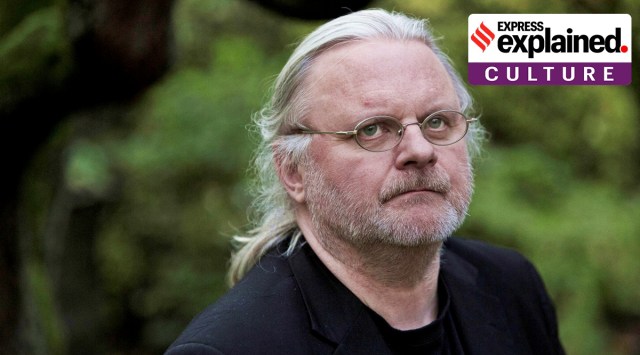Nobel Prize in Literature: In Norwegian laureate Jon Fosse’s ‘slow prose’, shades of Ibsen and Derrida
While Fosse is today “one of the most widely performed playwrights in the world, he has also become increasingly recognised for his prose”, the committee said.
 Writer Jon Fosse poses in Oslo, Norway December 8, 2015. (NTB/Ole Berg-Rusten via REUTERS)
Writer Jon Fosse poses in Oslo, Norway December 8, 2015. (NTB/Ole Berg-Rusten via REUTERS) In an interview given to The New Yorker in November last year, Norwegian playwright, poet, novelist, essayist, and translator Jon Fosse spoke of the place that he writes from — which is both a sanctuary and a dare: “That place is for listening and for movement, and it’s a very safe place to stay. But it can also be scary, because it’s the route for me to enter the unknown. I have to go to the borders of my mind, and I have to cross these borders. And to cross these borders is frightening if you’re feeling very fragile… I simply didn’t dare to write my own things because I was afraid of crossing these borders in myself. When I’m writing well, I have this very clear and distinct feeling that what I’m writing on is already written. It’s somewhere out there. I just have to write it down before it disappears.”
His focus on the subterranean that connects the personal with the universal won the 64-year-old this year’s Nobel Prize in Literature. In the citation, the Nobel committee commended Fosse’s “innovative plays and prose which give voice to the unsayable”, and spoke of his “immense oeuvre, written in Norwegian Nynorsk and spanning a variety of genres consists of a wealth of plays, novels, poetry collections, essays, children’s books and translations”.
While Fosse is today “one of the most widely performed playwrights in the world, he has also become increasingly recognised for his prose”, the committee said.
In his acceptance statement, Fosse said, “I am overwhelmed, and somewhat frightened. I see this as an award to the literature that first and foremost aims to be literature, without other considerations.”
Incidentally, Fosse shares his UK publisher Fitzcarraldo Editions with last year’s Literature laureate, French writer Annie Ernaux.
Fosse grew up in Norway’s Strandebarm, and currently divides his time between Norway and Austria. When he was seven, he had a near-fatal accident that would be a crucial stepping stone to his literary career. Over the years, his life experiences as a communist who converted to Catholicism in 2012, too, have fed his work.
His literary career began with a novel, Red Black, published in 1983. His subsequent novels included Melancholy I (1995) and Melancholy II (1996), on the life and death of 19th century Norwegian landscape artist Lars Hertervig. Over the next few years, he turned towards playwriting. Some of his most notable plays include Someone is Going to Come, And Never Shall We Part, The Name, Winter, and A Summer’s Day. The last volume of his three-part novel Septology was shortlisted for the International Booker Prize last year.
A proponent of “slow prose”, Fosse’s work is often compared to that of his predecessor Henrik Ibsen for its modernist concerns, and to Jacques Derrida for his ability to tap into the unspoken.
- 01
- 02
- 03
- 04
- 05






































